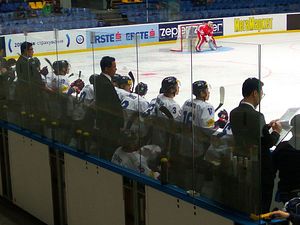In February 2018 the South Korean men’s national ice hockey team will make its Olympic debut, hosting reigning gold medal champion Canada in Pyeongchang. Not a traditional hockey power by any means, the Koreans have spent the past seven years since being awarded the Olympics drastically improving their level of play, and have finally seen the results of those efforts. At the 2017 World Ice Hockey Championship, South Korea, playing in Division I A, the second tier of the tournament, managed to earn a promotion to the following year’s top level tournament, which is reserved for the best 16 hockey-playing nations in the world. Thus 2018 will mark both South Korea’s debut at the Olympics and the main World Championships.
How the Koreans achieved this rapid rise through the ranks (they were rated 31st in the world when awarded the Olympics in 2011, and will enter 2018 as the 18th best) is no secret. Like many other nations that don’t have a strong domestic hockey program, South Korea has spent the past several years recruiting North American hockey players to come and play for teams in the country, and then naturalizing them, allowing them to play for the national team (the International Ice Hockey Federation, the governing body of ice hockey, requires a player to spend at least two years in their new country before they can play for them internationally).
Thus the Korean team at the 2017 World Championship was dotted with notably un-Korean names like Bryan Young, Michael Swift, Matt Dalton, or most recently, Alex Plante. This is not an unusual situation, as four of the six teams at the Division I A tournament had naturalized players on their team, and historically other nations have done the same, though often with players who have some ancestral connection to the country.
The Koreans, though, brought in anyone willing to join them, which mainly consists of players who are unable to make a team in the United States’ National Hockey League (NHL), the top league in the world, or one of its minor league affiliates. While that seemed like a daunting issue for the upcoming Olympics, where it was presumed the NHL would allow its players to participate for the sixth consecutive time, in early April the league announced it would not participate in the next Winter Games. Thus the chances of the Koreans greatly improved.
The story of the South Korean plans for their Olympics also has an impact on the next host after them, Beijing, China, in 2022. Unlike the Koreans, who have strove to improve their national team, the Chinese hockey team has seen little improvement since they were awarded the Olympics in 2015; they are currently the 35th best team in the world, out of 48 countries that participated in 2017, and most recently earned promotion to Division II A, the fourth tier of the World Championship level.
However China does have the ability to make rapid strides if they so desire. The Russian-based Kontinental Hockey League (KHL), widely regarded as the top league after the NHL, established a team in Beijing in 2016, Kunlun Red Star, which was supported by the Chinese government. In order to stock the team, several Canadians and Americans of Chinese ancestry were invited to try out, with two of them ultimately joining, as well as Rudi Ying, who was born in China and the first Chinese-born player in either the KHL or NHL.
This is a key component for the success of the Chinese national team, if they so desire. As noted the IIHF allows players to play internationally for a new country if they spend two years there, or four if they have already appeared in an international tournament. While it has proven difficult to attract players to the Beijing-based team, which has to fly several hours to play any other team, there are many Canadians and Americans with Chinese ancestry playing hockey who are a lot more willing to relocate to China, especially with the prospect of competing at the Olympics. To that end Kunlun announced in March they had hired former NHL and KHL champion coach Mike Keenan to head the team, with instructions to develop Chinese players in the coming years so they are ready for the Olympics. Keenan is known as a tough authoritarian coach, but able to get results, so it may be exactly the thing the Chinese need.
The use of imported players for national teams is a controversial one in some circles of international hockey, but as South Korea has shown, it can produce results. It remains to be seen if the Koreans will be competitive at the 2018 Winter Olympics, but without the NHL there they stand a far better chance now. Whether the Chinese want to follow the same path so they can put on a decent performance in 2022 is to be determined, though they certainly have the ability and the willpower to do so. Either way, hockey in East Asia is starting to be recognized as something to be aware of.
Matt Lerner has an MA in European, Russian, and Eurasian Studies from Carleton University in Ottawa, Canada.

































